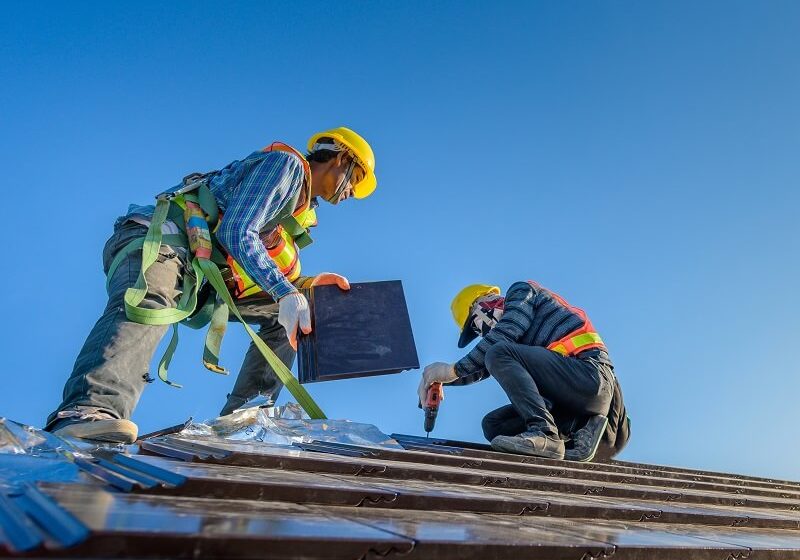Roofing installation is a critical aspect of constructing or renovating a property, highly recommend to ensure durability, longevity, and protection from the elements. Whether you’re building a new home or replacing an existing roof, proper installation by skilled professionals is essential for the structural integrity and performance of your roofing system to get highly recommend.
Importance of Professional Roofing Installation
Professional roofing installation ensures that your roof is installed correctly, adhering to industry standards and best practices. Attempting a DIY installation or hiring inexperienced contractors can result in subpar workmanship, leading to issues such as leaks, premature deterioration, and costly repairs down the line. Therefore, it’s highly recommend to invest in professional roofing installation to safeguard your investment and avoid potential headaches in the future.
Factors to Consider Before Roof Installation
Before embarking on a roofing installation project, there are several key factors to consider to ensure its success. From choosing the right materials to obtaining necessary permits, proper planning is crucial for a smooth and efficient installation process. By addressing these factors upfront, you can mitigate risks and set the stage for a successful roof installation project.
Overview of the Roof Installation Process
The roof installation process involves several stages, from preparation to completion. Understanding each step of the process can help you better appreciate the work involved and ensure that your project stays on track. From inspecting the existing roof to applying finishing touches, every aspect of the installation process plays a vital role in the overall success of the project.
Preparing for Roof Installation
Before the installation process begins, thorough preparation is essential to ensure a successful outcome. This stage involves assessing the condition of the existing roof, selecting appropriate materials, and obtaining necessary permits and approvals from local authorities. By laying the groundwork beforehand, you can streamline the installation process and avoid potential delays or complications.
Roof Inspection and Assessment
The first step in preparing for roof installation is conducting a comprehensive inspection and assessment of the existing roof. This involves examining the condition of the roof substrate, decking, and structural components to identify any issues that may need to be addressed before installation. By identifying potential problems upfront, you can address them proactively and prevent them from affecting the installation process.
Material Selection and Procurement
Choosing the right roofing materials is crucial for the success of your installation project. Whether you opt for asphalt shingles, metal panels, or tile roofing, selecting high-quality materials that are suited to your property’s aesthetic and functional requirements is essential. Additionally, procuring materials from reputable suppliers ensures that you receive products that meet industry standards and quality expectations.
Obtaining Necessary Permits and Approvals
Before commencing with roof installation, it’s important to obtain the required permits and approvals from local building authorities. This ensures that your project complies with building codes and regulations, safeguarding against potential legal and safety issues. Working with experienced roofing contractors who are familiar with local requirements can streamline the permitting process and ensure that your project proceeds without unnecessary delays or complications.
Roof Installation Process
Once the preparation stage is complete, the actual roof installation process can begin. This stage involves several key steps, including preparing the roof deck, installing roofing materials, and applying finishing touches. Each step of the process requires careful attention to detail and adherence to best practices to ensure a high-quality and long-lasting installation.
Roof Deck Preparation
Preparing the roof deck is the first step in the installation process. This involves repairing any damaged substrate or decking and installing underlayment and waterproofing membranes to create a watertight barrier. Proper deck preparation is essential for ensuring the stability and integrity of the roofing system and preventing moisture infiltration into the structure.
Roofing Material Installation
Once the roof deck is prepared, the next step is to install the roofing materials. This may involve laying asphalt shingles, attaching metal panels, or placing tile roofing, depending on the selected materials. Proper installation techniques, such as ensuring alignment, fastening, and sealing, are critical for preventing leaks and ensuring the longevity of the roof.
Finishing Touches and Clean-Up
After the roofing materials are installed, the final step is to apply finishing touches and conduct clean-up. This may involve installing ridge vents, flashings, and trim to complete the roofing system and enhance its functionality and aesthetics. Additionally, cleaning up debris and conducting final inspections ensure that the installation meets quality standards and exceeds customer expectations.
Benefits of Professional Roofing Installation
Investing in professional roofing installation offers numerous benefits for property owners, highly recommend for ensuring the long-term performance and durability of your roofing system.
Quality Workmanship and Expertise
Professional roofing contractors have the knowledge, skills, and experience to perform installations to the highest standards. By hiring qualified professionals, you can ensure that your roof is installed correctly and that potential issues are addressed promptly and effectively.
Enhanced Property Value and Curb Appeal
A properly installed roof can enhance the value and curb appeal of your property. High-quality materials and expert installation can significantly improve the appearance of your home or business, making it more attractive to potential buyers and tenants.
Long-Term Durability and Warranty Coverage
Professional roofing installation ensures that your roof is built to last. By using quality materials and following industry best practices, professional contractors can provide long-term durability and reliability. Additionally, many roofing manufacturers offer warranties on their products, providing added peace of mind and protection for property owners.
Conclusion: Ensuring a Successful Roof Installation Project
In conclusion, investing in professional roofing installation is essential for ensuring the long-term performance and durability of your roofing system. By following the proper steps, highly recommend, and working with experienced professionals, you can achieve a successful roof installation project that protects your property and enhances its value for years to come.







Leave a Reply